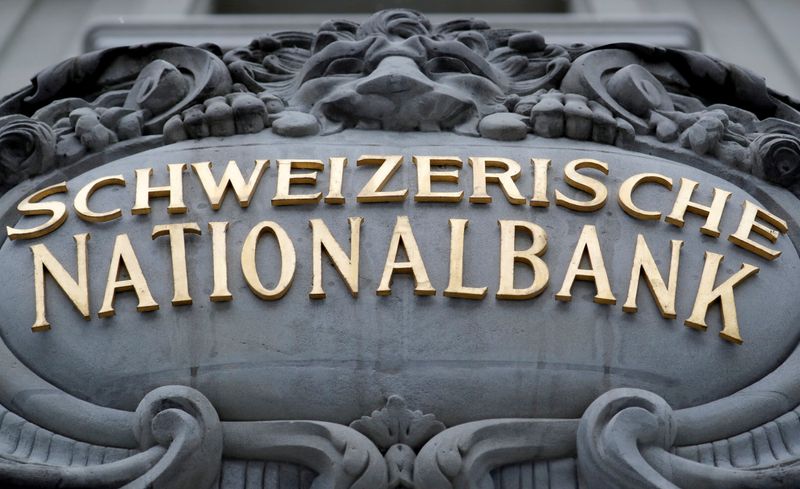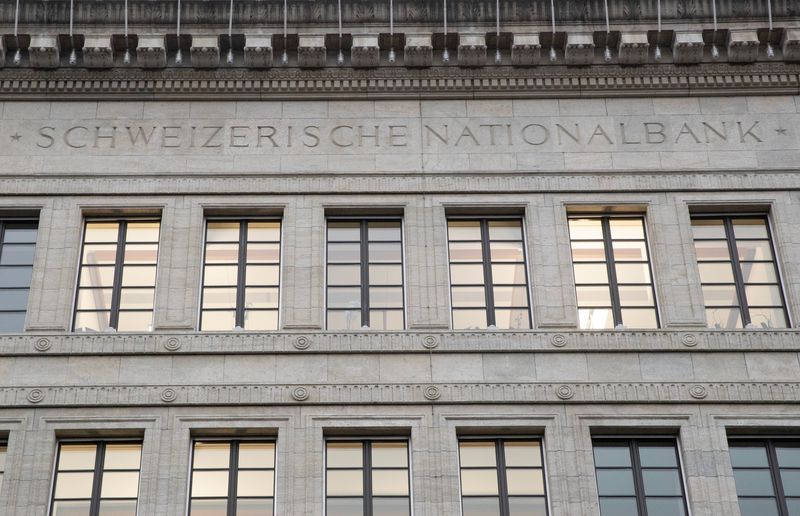By Indradip Ghosh and John Revill
BENGALURU/ZURICH (Reuters) - The Swiss National Bank will keep its negative policy interest rate unchanged on Thursday and will not raise it to zero until early next year, according to a majority of economists polled by Reuters, despite the highest inflation in 14 years.
That would leave the SNB as the only central bank in the world with a negative policy rate from late September or possibly sooner as the European Central Bank has already pre-announced rate rises over its coming two meetings.
Most major central banks are now rushing to tighten policy, with even more aggressive expectations for the U.S. Federal Reserve - now delivering back-to-back 50 basis point rises - sending financial markets into a tailspin this week.
Twenty-four of 26 economists expect the SNB to keep its policy rate steady at minus 0.75%, the lowest in the world and the rate it has maintained since 2015, at its monetary policy assessment on Thursday.
Two respondents expect a 25 basis point rate rise from the SNB, which last raised rates 15 years ago.
A further 19 of 26 economists forecast the SNB policy rate to reach -0.50%, where the ECB's rate is now, or higher at the September meeting. Four of those expect rates at -0.25% by then, implying two quarter-point or one half-point rate rises.
"The SNB is probably not willing to wait too long to start normalising its monetary policy stance," said Andreas Rees, economist at UniCredit, who expects a September hike.
"After all, the window of opportunity to do so could close amid substantial geopolitical and economic risks, such as a further cooling of the global economy, which would hurt the export-dependent Swiss economy."
Only 6 of 26 expect the rate to be at zero or higher by the end of the year. A majority, 17 of 23, said rates would be zero or higher only by the end of the first quarter of next year.
David Oxley, economist at Capital Economics, was the only poll respondent who predicted a rate rise at an unscheduled meeting following a widely-expected ECB move next month.
"The SNB will mirror the ECB by keeping its policy settings unchanged once again at its June meeting. But with a July rate hike by euro-zone policymakers now locked in, the era of policy stasis in Switzerland is drawing to a close, and an unscheduled rate rise by the SNB ... now seems the most likely outcome," Oxley said.
Swiss inflation reached 2.9% in May, its highest in 14 years and above the SNB's target range of 0-2%. It is likely to remain elevated for some time, under the same upward pressure as in most other economies, partly because of higher energy and food prices.
Since hitting its highest level since 2015 against the euro a little over three months ago, the Swiss franc - which the SNB up until recently had been keen to weaken - has slipped about 4%.

Karsten Junius, an economist at J.Safra Sarasin says the Swiss franc is no longer overvalued and said the real effective exchange rate dipped below its 10-year average last month.
"Hence, there is no reason for the Swiss National Bank to wait any longer," he added.
(Polling by Sarupya Ganguly and Indradip Ghosh; Editing by Ross Finley and Edmund Blair)
